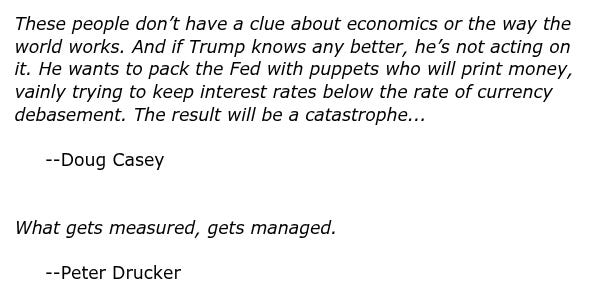Beyond Reckoning
As an indicator of real wealth, happiness, or progress, GDP is worthless. All you have to do to raise GDP is to invite in more immigrants. As each one buses and schleps, total output goes up.
Wednesday, November 12th, 2025
Bill Bonner, from Baltimore, Maryland
As expected, the shutdown came to an end in the customary way: both parties agreed to keep spending other people’s money. CBS News:
The final deal will include a 31-page continuing resolution that extends current levels of government funding through January 2026 to give lawmakers more time to finalize full-year spending bills.
But let’s pick up our theme from yesterday and examine it in daylight. Do our leaders actually know what they are doing? And how much of what they think they know is just self-serving claptrap?
The conclusion we come to is that policymakers have created wretched fantasy of mumbo-jumbo statistics and jackass equations. Using these self-serving metrics, they pretend to quantify, measure, and control the economy.
But the formulae are bogus. And so is the ‘science’ behind them. Take the simplest, broadest, most dumb-assed assessment of economic performance — GDP. Everyone will tell you that it’s better for GDP to be going up than down.
But is it?
When GDP is going up, they believe people are getting richer. Politicians take credit when GDP growth speeds up; they blame their predecessors when it goes down. But as an indicator of real wealth, happiness, or progress, GDP is worthless. All you have to do to raise GDP is to invite in more immigrants. As each one buses and schleps, total output goes up.
Would that be better?
We’ve seen, too, that GDP captures credit-fueled spending, but not the cost of the debt that is dragged along behind. So, if the feds borrow and spend another $5 trillion, GDP would go up by a $5 trillion...would that be better?
And in the US currently GDP growth is only positive because of massive investments in the AI sector. Oh how the angel wings flutter and flap there! That is to say, it’s more of a speculation than a fact.
Meanwhile, nearly half of GDP is government spending — state, local, and federal. Some of that is actually beneficial — roads, schools, etc. But at least half of the war budget, for example — $500 billion — is unnecessary and probably negative.
In 1944, 75% of Germany’s GDP went for its war effort. The more tanks and artillery rolled off the Ruhr Valley assembly lines, the more Germany’s GDP rose. Who was better off?
And if the US feds were to mount a major attack on Venezuela or Nigeria — GDP would go up. Would Americans be richer as a result?
And what about an unemployed man who raises his food — with a backyard full of fruits, vegetables, pigs, chickens, and goats — and heats his home with wood he chops himself? No income; few expenses. Is he not depriving the USA of GDP?
A few years ago, we reported on a case revealed by the New York Times. It was a ‘human interest’ story about a man diagnosed with terminal cancer who decided to return to his native Greece to finish off his life.
This was a very unpatriotic thing to do. The US GDP never got a boost, neither from a long and costly battle with cancer...nor from a funeral service. No expensive lilies adorned his open casket. No hearse took him to the graveyard. No undertaker counted his fees.
Instead, the S.O.B. spent the next 30 years tending his garden...drinking his own wine...and dancing to music of bouzouki and lyre ‘til late at night. He contributed almost nothing to GDP. Was that bad?
Policymakers set measurable goals. But the goals are scammy and the numbers are flim-flammy. And every ‘plus’ they advertise has a ‘minus’ lurking in the bushes.
For instance, they say they will boost home ownership...or ‘create jobs.’ We saw, thanks to Joe Withrow (see below), how the feds encouraged home ownership after 2008. Lower interest rates were supposed to induce people to buy houses. And they did. And soon house prices were so high average people could no longer afford average houses.
And while mortgage rates for honest families still averaged about 6%, the insiders on Wall Street — such as BlackRock or Invitation Homes —were able to borrow at real rates of 1% or less. Using this advantage,they could outbid homeowners on more than half a million houses.
We’ve seen, too, that the Fed can diddle stock market prices higher with low rates. Then, POTUS tells us how this proves that he’s doing such a good job. Higher stock prices are a plus, right?
But why? Most people are not long stocks; they are short. They don’t own them. So, when stocks go up, most people lose money (relatively). And in 1971, an average working man earned enough per year to buy nearly ten units of the Dow (ten of each of the stocks in the Dow average). Today, he would have to work more than six years to buy the same stocks.
How is that better?
Better for whom?
And what kind of thing are we dealing with? How come science and engineering stumbles? Just as medieval scholars couldn’t count angels, there are some things, today, beyond the economists’ numbers.
Isn’t it really a ‘human interest’ story after all?
More to come...
Regards,
Bill Bonner





If nothing else, your column is a reminder of the pervasiveness of government’s intrusion into our lives. Love the anecdote of spending last days drinking wine, listening to music and dancing rather than being a prisoner of continuing care.
For the sake of appearances, government transfer payments are counted as GDP. Um, Houston, we have a problem: self-deception (the best kind, evidently).